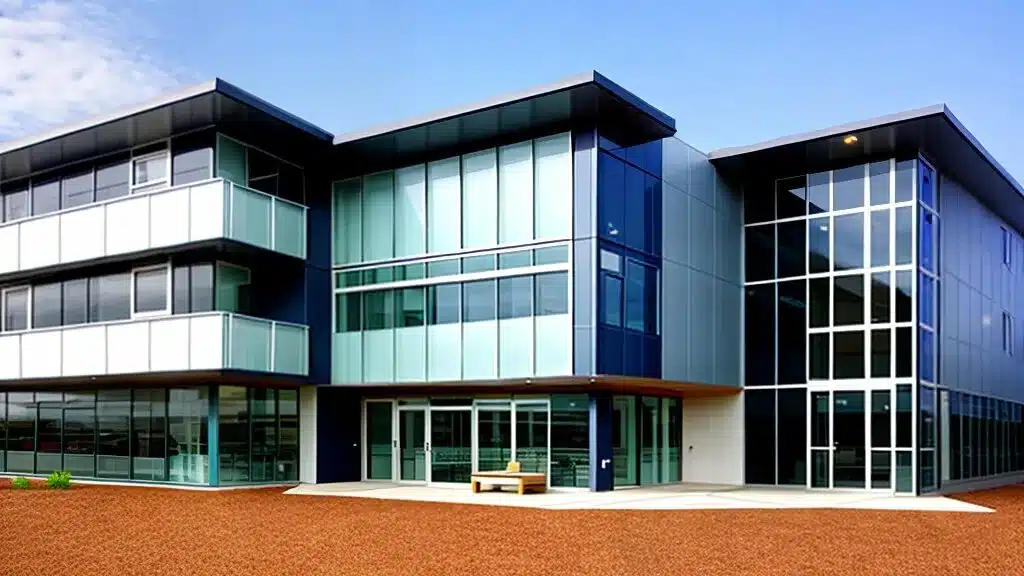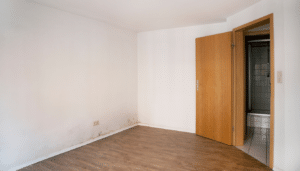As a property owner or manager, you understand the importance of creating a safe and healthy environment for occupants. One area that can pose a significant risk to both health and property is mould growth.
While many types of mould can occur in commercial buildings, the good news is that prevention is possible by selecting the right mould-resistant building materials.
Commercial-grade mould-resistant products are specifically designed to inhibit the growth of mould and mildew, making them an essential component of any commercial build project.
In this article, we will explore the benefits of using mould-resistant materials and provide guidance on how to choose the right products for your commercial property.
Key Takeaways:
- Selecting mould-resistant materials for commercial builds is essential in creating a safe and healthy environment for occupants.
- Commercial-grade mould-resistant products are designed to inhibit the growth of mould and mildew.
- This article will explore the benefits of using mould-resistant materials and provide guidance on how to choose the right products for your commercial property.
Statistics on mould in UK commercial buildings
In a 2018 survey by the British Occupational Health Research Foundation (BOHRF) found that 25% of UK office workers reported having experienced mould in their workplace.
The 2019 study by the University of Manchester found that mould was present in 80% of UK schools.
According to a study by the Building Research Establishment (BRE), mould is present in around 30% of UK homes. In a 2020 study, they found that mould was a major cause of property damage in UK commercial buildings, with an estimated cost of £1.5 billion per year.
Understanding the Risks of Mould Growth in Commercial Buildings.
As a business owner or property manager, you have a responsibility to ensure the health and safety of your occupants. Mould growth in commercial buildings can pose a significant risk to the wellbeing of everyone who enters the premises.
Mould thrives in warm and damp environments, making commercial properties a prime location. When mould spores are inhaled, they can cause a range of health problems, including respiratory issues, allergies, and infections. This can lead to loss of productivity, sick days, and even legal action if the issue is not addressed in a timely and effective manner.
Furthermore, mould growth can cause damage to the structure and aesthetics of your property, reducing its value and increasing repair costs.
It is crucial to understand the risks of mould growth in commercial buildings and take proactive measures to prevent it from occurring.
Benefits of Using Mould Resistant Materials in Commercial Builds
When considering materials for your commercial property, selecting mould-resistant options offers a number of benefits. These materials can help prevent the growth and spread of mould, improving indoor air quality and creating a healthier and safer environment for occupants.
Mould-resistant materials are designed to resist the build-up of moisture that can lead to mould growth. By using them in your commercial build, you can reduce the risk of costly damage to the property and potential health risks to those who use it.
Factors to Consider When Choosing Mould-Resistant Materials
Choosing the right mould-resistant materials is crucial when it comes to preventing mould growth in your commercial property. Here are some essential factors to consider:
- Durability: Select materials that are strong enough to withstand wear and tear over time, such as moisture-resistant drywall or vinyl flooring.
- Moisture Resistance: Moisture is the primary cause of mould growth, so it’s important to choose materials that can resist moisture, such as mould-resistant paint or mould-resistant insulation.
- Compatibility: Ensure that the mould-resistant materials you select can work well with other building components, such as insulation, heating, and ventilation systems.
- Certification: Look for materials that have been certified as mould-resistant by national standards organisations, such as the British Standard for Mould Resistance BS EN 846 and the ASTM D3273 standard in the US.
- Installation: Proper installation is essential for the effectiveness of mould-resistant materials. Ensure that the materials are installed according to the manufacturer’s guidelines and by experienced contractors who specialise in mould-resistant construction.
By considering these factors, you can select the right mould-resistant materials for your commercial property, which will help prevent mould growth and create a healthier and safer environment for your occupants.
Types of Mould-Resistant Materials for Commercial Builds
There are several types of mould-resistant materials available for commercial builds that can help prevent mould growth and improve indoor air quality. Here are some options:
Mould-Resistant Paint
Mould-resistant paint contains anti-microbial additives that help prevent mould growth. It can be applied to surfaces such as walls, ceilings, and trim. Look for commercial-grade mould-resistant paint that is specifically designed for high-traffic areas.
Moisture-Resistant Drywall
Moisture-resistant drywall is made with a special moisture-repellent core and is designed to resist moisture and mould growth. It’s an excellent choice for areas that are prone to dampness, such as bathrooms and kitchens.
Anti-Microbial Flooring
Anti-microbial flooring is designed to resist mould and bacteria growth. It’s made with materials that are non-porous and moisture-resistant, making it an ideal choice for areas of high foot traffic and moisture, such as entryways and bathrooms.
Other Options
Other options for mould-resistant building materials include moisture-resistant insulation, anti-microbial sealants, and mould-resistant drywall tape. Consult with a professional contractor to determine the best options for your commercial property.
Best Practices for Installing Mould-Resistant Materials
Installing mould-resistant materials in a commercial building is an investment that can help prevent health hazards associated with mould. To ensure the effectiveness of these products, it is crucial to follow some best practices during installation. Here are some key tips to keep in mind:
1. Follow Manufacturer Guidelines
When installing mould-resistant materials, it is essential to follow the manufacturer’s instructions carefully. This ensures that the product is installed correctly and its benefits are maximised. Different products may have specific installation requirements, so it is crucial to read and understand the guidelines for each product you use.
2. Work with Experienced Contractors
It is recommended to work with experienced and qualified contractors who specialise in mould-resistant construction. These professionals have the expertise and knowledge to handle the installation of these products properly. They can help choose the right materials and ensure that they are installed correctly and according to industry standards. Working with mould experts can help you avoid potential problems and ensure that your commercial building is mould-free.
3. Ensure Compatibility with Other Building Components
Mould-resistant materials are designed to work in conjunction with other building components. It is essential to ensure that the materials you use are compatible with other construction components, such as insulation, drywall, or flooring. Failure to do so may create gaps where mould can grow. Consult with your contractor or supplier to ensure that the materials you are using are compatible with other building components.
Maintaining Mould-Resistant Materials in Commercial Buildings
Regular maintenance of mould-resistant materials is crucial to ensure their effectiveness in preventing mould growth and maintaining the health and safety of occupants in commercial buildings. Here are some best practices to follow:
- Follow manufacturer guidelines for cleaning and maintenance of mould-resistant materials.
- Regularly inspect all areas of your commercial property for signs of mould growth, such as musty odours, discoloured walls or ceilings, or moisture on surfaces.
- Ensure good ventilation and airflow throughout your commercial property to prevent the buildup of moisture.
- Immediately address any leaks or other sources of moisture that may be present in your commercial property.
- Use a recommended cleaning solution and approach when cleaning mould-resistant materials. Avoid using harsh chemicals or abrasive cleaning tools that may damage the materials.
- Partner with a professional mould cleaning service like AirFresh Mould Removal London to ensure safe and effective cleaning of mould-resistant materials in your commercial property. Our team of experts has the experience and qualifications necessary to provide high-quality cleaning services that comply with all relevant health and safety regulations.
Remember, regular maintenance of mould-resistant materials is key to preventing mould growth and ensuring the health and safety of occupants in your commercial property.
The Dangers of DIY Mould Removal
If you discover mould growing in your commercial property, it may be tempting to attempt to remove it yourself. However, this is strongly discouraged. DIY mould removal can be extremely dangerous, both for your health and for the health of anyone else who occupies the property.
When mould is disturbed, it releases spores into the air, which can cause respiratory problems and other health issues. In addition, improperly removing mould can cause it to spread to other areas of the property, making the problem even worse.
To protect yourself and others, it is important to call in a professional mould specialists like AirFresh Mould Removal London. Our experienced team uses industry-standard equipment and techniques to safely and effectively remove mould from commercial properties, minimising the risk of harm to you and your occupants.
Expert Mould Removal Service in London
If you are dealing with a mould problem in your commercial property, it is essential to seek the help of a professional mould removal service. At AirFresh Mould Removal London, we are committed to providing safe and effective mould removal solutions for commercial properties across the UK.
Our team of experts is highly skilled and experienced in dealing with all types of mould, from minor cosmetic issues to more severe cases that pose a risk to human health. We use the latest equipment and techniques to identify and remove mould from your property, ensuring that it does not return in the future.
Our qualified technicians also provide guidance on how to prevent future mould growth, and we offer regular maintenance services to ensure the effectiveness of mould-resistant materials in your commercial property.
At AirFresh Mould Removal London, we understand the importance of creating a healthy and safe environment for your staff and customers. That’s why we offer a fast, reliable, and cost-effective solution to your mould problem. Contact us today to learn more about our services and how we can help you.
Cost Considerations for Mould-Resistant Materials in Commercial Builds
While selecting mould-resistant materials for your commercial property is essential to ensuring a healthy and safe environment, it is also important to consider the cost implications of these materials. While the initial cost may be higher than traditional building materials, the long-term savings can make the investment worthwhile.
By using commercial-grade mould-resistant products, you can reduce the risk of costly mould remediation and avoid potential legal liabilities. Additionally, mould-resistant materials can help improve indoor air quality and create a more comfortable and healthy work environment, which can increase employee productivity and reduce sick days.
When considering the cost of mould-resistant materials, it is important to take into account the lifespan of the materials and the potential return on investment. Cheaper building materials may seem like a cost-effective solution in the short-term, but they may not last as long and could ultimately lead to higher long-term costs.
Ultimately, the cost of mould-resistant materials should be viewed as an investment in the health and safety of your occupants, as well as the long-term value of your commercial property. By choosing high-quality, durable materials that prevent mould growth, you can create a safer, healthier, and more valuable environment for everyone.
Conclusion
Choosing mould-resistant materials for your commercial property is crucial for preventing mould growth and creating a healthy, safe environment for occupants. By selecting the right products and working with experienced contractors to ensure proper installation, you can protect your property from the risks associated with mould growth.
Regular maintenance is also key to ensuring the long-term effectiveness of mould-resistant materials. Be sure to follow recommended cleaning techniques and consider partnering with a professional mould cleaning service for added peace of mind.
While the upfront costs of mould-resistant materials may be higher, they offer significant long-term savings and a strong return on investment. By investing in these products, you’re investing in the health and safety of your property’s occupants.
Choose AirFresh Mould Removal London for Expert Service
If you do encounter mould growth in your commercial property, never attempt to remove it yourself. DIY mould removal can be dangerous and may lead to further health hazards.
Instead, rely on the expert mould removal services of AirFresh Mould Removal London. Our team of experienced professionals is dedicated to providing safe and effective mould removal solutions for commercial properties throughout the UK. Trust us to protect your property and your occupants’ health.
Thank you for reading our guide to selecting mould-resistant materials for your commercial property. We hope this information has been helpful in guiding your decision-making process. For more information on how AirFresh can help protect your property, please contact us today.
FAQ
Q: Why is it important to select mould-resistant materials for commercial builds in the UK?
A: Selecting mould-resistant materials for commercial builds in the UK is essential to prevent mould growth, improve indoor air quality, and create a healthier and safer environment for occupants.
Q: What are the potential risks associated with mould growth in commercial buildings?
A: Mould growth in commercial buildings can impact the health and safety of occupants. It can cause allergies, respiratory issues, and worsen existing health conditions.
Q: What are the benefits of using mould-resistant materials in commercial builds?
A: Using mould-resistant materials in commercial builds helps prevent mould growth, improves indoor air quality, and creates a healthier and safer environment for occupants.
Q: What factors should be considered when choosing mould-resistant materials?
A: When selecting mould-resistant materials for commercial builds, factors such as durability, moisture resistance, and compatibility with other building components should be considered.
Q: What types of mould-resistant materials are available for commercial builds?
A: There are various mould-resistant materials available for commercial builds, including mould-resistant paint, moisture-resistant drywall, and anti-microbial flooring.
Q: What are the best practices for installing mould-resistant materials in commercial builds?
A: It is important to follow manufacturer guidelines and work with experienced contractors specialising in mould-resistant construction to ensure proper installation of these materials in commercial builds.
Q: How should mould-resistant materials be maintained in commercial buildings?
A: Regular maintenance is essential to ensure the effectiveness of mould-resistant materials in commercial buildings. Recommended cleaning techniques should be followed, and partnering with a professional mould cleaning service is beneficial.
Q: Why is DIY mould removal dangerous in commercial properties?
A: DIY mould removal in commercial properties is dangerous due to potential health hazards. It is strongly recommended to call a professional mould removal service such as AirFresh Mould Removal London.
Q: Why should I choose AirFresh Mould Removal London for expert mould removal service?
A: AirFresh Mould Removal London is an experienced and qualified mould removal service in the UK. We are committed to providing safe and effective mould removal solutions for commercial properties.
Q: What are the cost considerations for mould-resistant materials in commercial builds?
A: When choosing mould-resistant materials for commercial builds, upfront costs should be considered along with long-term savings and the return on investment that can be achieved by using these materials.
Q: What is the importance of selecting mould-resistant materials for commercial builds?
A: Selecting mould-resistant materials for commercial builds is crucial for preventing mould growth and creating a healthier and safer environment for occupants.
For safe and effective mould removal, trust our team of certified experts. We employ advanced techniques and equipment to eliminate mould thoroughly, preventing its recurrence.
Protect your commercial property and the health of your occupants. Call us at 0203 130 4068 to schedule a mould inspection or removal service.



